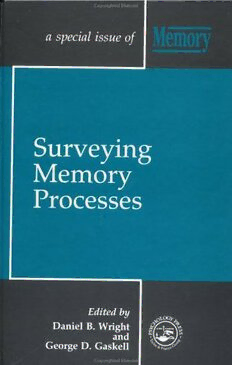
Surveying Memory Processes: A Special Issue of Memory (Special Issues of Memory) PDF
138 Pages·1998·2.148 MB·English
Most books are stored in the elastic cloud where traffic is expensive. For this reason, we have a limit on daily download.
Preview Surveying Memory Processes: A Special Issue of Memory (Special Issues of Memory)
Description:
Over the past two decades, survey researchers and cognitive psychologists have joined forces to apply theories and methods from psychology to improve survey instruments. This collaboration has also allowed psychologists to explore the applicability of their theories using techniques usually not used in psychology experimentation. The field is often called "Cognitive Aspects of Survey Methodology", or CASM. This volume examines in particular how this cross-fertilization has been beneficial for memory research. The authors come from a variety of backgrounds and this diversity is reflected in the collection of papers. Empirical data and models for understanding the survey response process illustrate the state of the art in this rapidly expanding area.
See more
The list of books you might like
Most books are stored in the elastic cloud where traffic is expensive. For this reason, we have a limit on daily download.
